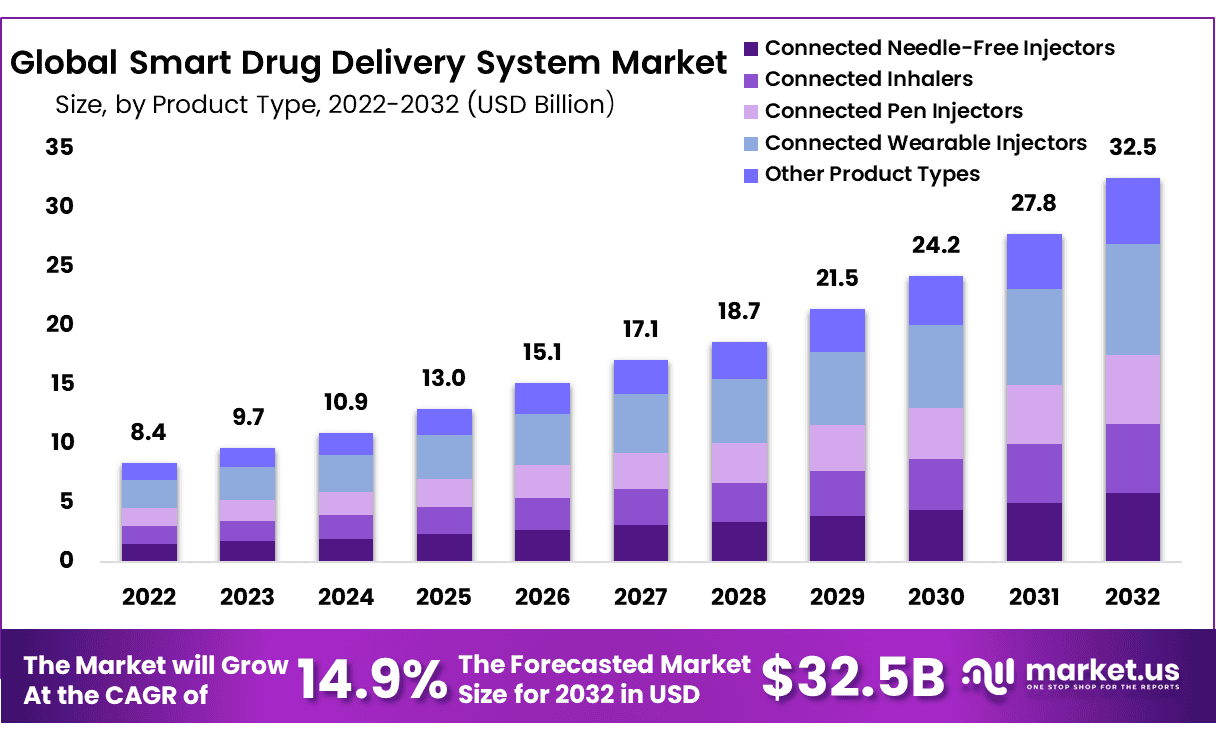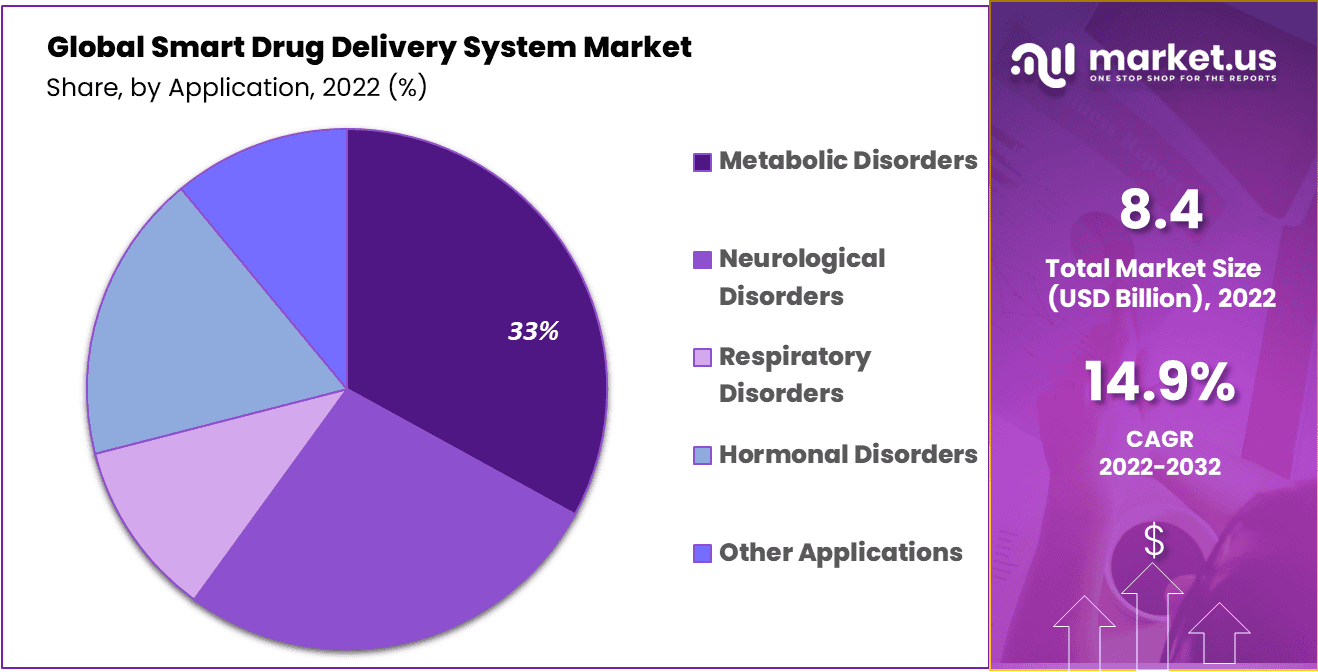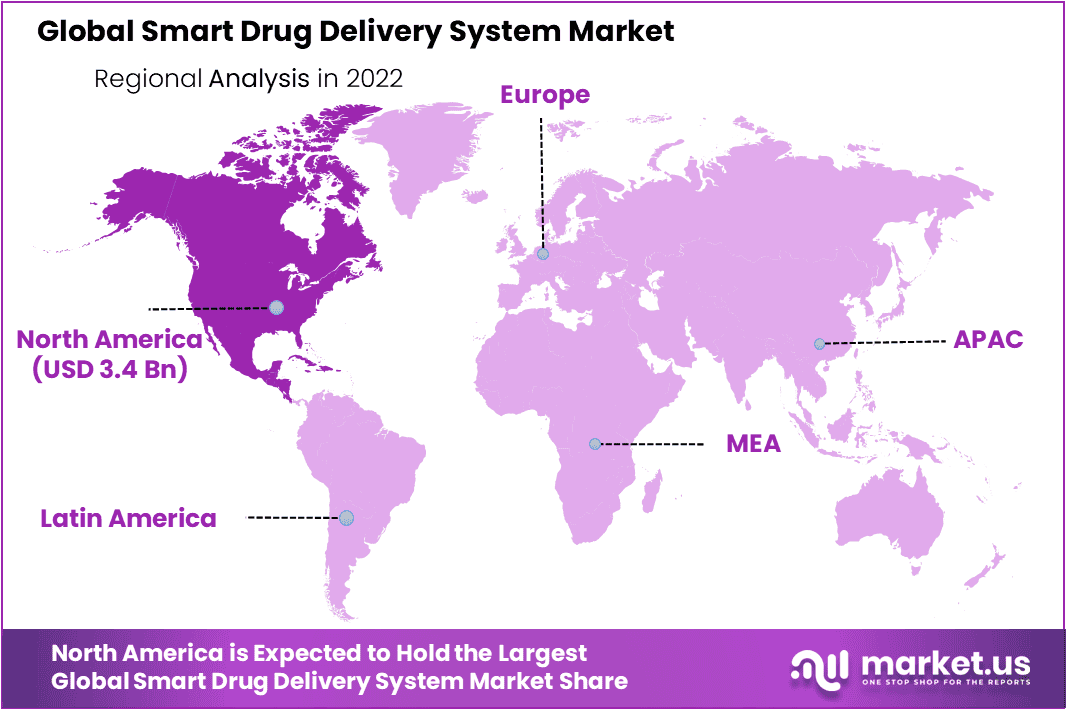Global Smart Drug Delivery System Market By Type (Connected Needle-Free Injectors, Connected Inhalers, Connected Pen Injectors, Connected Wearable Injectors, Ad-on Sensors, Others), By Application (Metabolic Disorders, Neurological Disorders, Respiratory Disorders, Hormonal Disorders and Others), By End User, By Region and Companies - Industry Segment Outlook, Market Assessment, Competition Scenario, Trends and Forecast 2023-2032
- Published date: Oct 2023
- Report ID: 105742
- Number of Pages: 364
- Format:
-
keyboard_arrow_up
Quick Navigation
Report Overview
In 2022, the Global Smart Drug Delivery System Market was valued at USD 8.4 Billion, and from 2023 to 2032 it is expected to reach more than USD 32.5 Billion, this market is estimated to register a CAGR of 14.9%.
Smart drug delivery system (SDDS) technology has the potential to revolutionize translational medicine. SDDSs may modify their chemical structure to respond to a variety of factors, such as illumination, pH, and redox, as well as magnetic fields, enzymes, and other environmental factors. The potential for SDDS to significantly enhance the efficacy and precision of drug delivery across a broad spectrum of diseases is immense. SDDSs are used to deliver medication to a patient in a more controlled and targeted way than traditional DDS systems.
By reducing dosage frequency while preserving drug concentrations in a specific organ or tissue for a prolonged period of time, SDDS offers a broad range of potential opportunities for reducing medication toxicity, reducing drug concentration variation, and increasing therapeutic efficacy.

*Actual Numbers Might Vary In The Final Report
The majority of anticancer medications are administered at the highest tolerated dose, and cancer patients commonly experience significant cytotoxic side effects, which constrict their alternatives for treatment. Lower medication dosages are possible with SDDSs while still achieving effective intracellular concentrations.
SDDSs may be used as an effective cancer treatment alternative to conventional chemotherapy. This review mainly focuses on strategies of targeted drug delivery systems in cancer cells, stimuli responsive drug delivery, inorganic Nano carriers, organic Nano carriers and connected injectors. Thus, market players are developing products that would help to achieve the desired therapeutic level instead of the frequent administration.
Key Takeaways
- Market Growth: The smart drug delivery systems market has experienced steady expansion over time due to rising consumer demand for more precise, user-friendly drug administration methods and advancements in microelectronics and biotechnology.
- Increased Drug Efficacy: Smart drug delivery systems offer greater precision when dispensing medication, helping ensure it reaches patients at just the right dose and time, which in turn results in enhanced therapeutic outcomes.
- Enhance Patient Adherence: These systems can aid patients in adhering to their medication regimen by automating it, decreasing missed doses and providing reminders when necessary.
- Smart Drug Delivery Systems Can Customized Treatment to Each Individual Patient’s Needs: By tailoring drug releases in real time based on biomarker or sensor input data, personalized medicine treatments can be provided individually for each patient.
- Connected Health: Connected health devices include many smart drug delivery devices that communicate directly with healthcare providers or transmit data directly into cloud-based platforms for monitoring.
Product Type Analysis
Connected Wearable Injectors accounted for the largest revenue share of 29% in 2022
Drug delivery devices that are wireless and smart are all about patient-administered therapy. The product type segment is classified into connected needle-free injectors, connected inhalers, connected pen injectors, connected wearable injectors, and other product types. The most popular type of device is the connected wearable injectors – they held the largest market share of 29% in 2022, and they are expected to grow over the next few years.
Connected wearable injectors efficiently monitor the volume and viscosity of the autoinjectors and prefilled syringes and dilutes the highly concentrated drugs into larger volumes. They are administered over a long period of time. Over a decade, various medical device companies and pharmaceutical companies have been putting their efforts to develop these injectors and introduce them to the market.
Application Analysis
Increasing Prevalence of Cardiovascular Diseases and Diabetes is driving the segment of Metabolic Disorders
In terms of application, the global smart drug delivery system market is segmented into metabolic disorders, neurological disorders, hormonal disorders and others. Amongst all the segments, metabolic disorders segment dominated the market with 33% share due to the rising prevalence of cardiovascular diseases and diabetes across the world. As per World Health Organization (WHO), about 422 million people across the world are affected with diabetes and most of them are located in low and middle-level countries. Moreover, 1.5 million deaths are imputed to diabetes every year.
End User Analysis
The homecare sector is anticipated to grow significantly over the forecast period.
Due to the increasing cases of cardiovascular diseases (CVDs), diabetes, chronic obstructive pulmonary disease (COPD), and other chronic diseases, the homecare segment is estimated to register a significant growth rate over the forecast period. Furthermore, the rising modernization in connected drug delivery devices are also expected to foster segment growth.
A significant reason which is driving the segment’s growth is the rising geriatric population in combination with the rising prevalence of diabetes, as geriatric patients typically require at-home care. According to data provided by the International Diabetes Federation (IDF) in 2022, it has been anticipated that 62% of all new instances of type 1 diabetes worldwide in 2022 were in adults aged 20 or older.

Key Market Segments
By Product Type
- Connected Needle-Free Injectors
- Connected Inhalers
- Connected Pen Injectors
- Connected Wearable Injectors
- Other Product Types
By Application
- Metabolic Disorders
- Neurological Disorders
- Respiratory Disorders
- Hormonal Disorders
- Other Applications
By End User
- Hospitals
- Clinics
- Homecare
- Other End-Users
Drivers
SDDSs can effectively reduce the dosage frequency
In contrast to the traditional DDS, SDDSs are able to effectively lower the dose frequency while maintaining drug concentration in the target organ/tissue for extended period of time. The SDDSs offer large insights and compelling properties for reducing drug concentration variability, reducing drug toxicity and increasing therapeutic effectiveness.
Rise in the number of chronic disorder cases
Out of all chronic diseases, the most common were hypertension and diabetes and they accounted for 38% and 31% respectively. According to the Centers for Disease Control and Prevention (CDC), 35% of adults aged 50 and over will have one or more chronic conditions by 2032. With rising number of such chronic disease cases, the demand for SDDS is expected to rise in the coming years.
Restraints
Risk of Failure and high maintenance cost
The implementation of Internet of Things (IoT) is expected to reduce healthcare costs in the long-term. However, the implementation of IoT in hospitals and the associated staff training costs are relatively high. Hardware failure or malfunction, or even a power outage, can have a detrimental effect on the functioning of sensors and interconnected devices, endangering healthy operations. Furthermore, a software update that has not been scheduled can be more hazardous than a medical examination.
Opportunity
IoT drug delivery system can offer a modern approach to treatment, evolving in reinforced patient care.
The future prospects for smart drug delivery systems are rich and encouraging. These systems have the potential to revolutionize the healthcare industry by improving patient outcomes and transforming healthcare. With advances in technology and the growing demand for personalized medicine, IoT-based medication delivery can provide a personalized approach to treatment, improving patient care.
Integrating IoT devices into medication delivery systems can provide real-time monitoring of patient health, allowing healthcare professionals to adjust treatment accordingly, and improving patient outcomes. In addition, IoT-based medication management can also increase the efficiency and accuracy of medication administration, which reduces medication errors and improves patient compliance.
Trends
Achieving New Heights in Subcutaneous Drug Delivery with Liquid Flow Sensors
In the wake of the coronavirus pandemic, there has been a surge in the adoption of digitalization and patient-centric approaches in healthcare. Smart drug tracking has gained new relevance due to an increase in self-treatment requirements and developments in biotechnology.
Regional Analysis
North America is expected to hold a Significant Share in the Smart Drug Delivery Devices Market over the Forecast Period
North America was the largest regional market for smart drug delivery devices with a market share of 31% due to the increase in the incidence rate of chronic diseases as well as due to the presence of a vast target population base. Rise in adoption of novel and improved devices, availability of advanced technologies, and key market participants in the US and Canada are driving the market in the region. Abbott Laboratories has strong presence in the US, which further drives the North America market.
Due to the rise in population, increase in prevalence of cardiovascular diseases, and expansion in healthcare infrastructure, the Asia Pacific region is expected to witness the fastest growth.

Key Regions
- North America
- The US
- Canada
- Europe
- Germany
- France
- The UK
- Spain
- Italy
- Russia & CIS
- Rest of Europe
- APAC
- China
- Japan
- South Korea
- India
- ASEAN
- Rest of APAC
- Latin America
- Brazil
- Mexico
- Rest of Latin America
- Middle East & Africa
- GCC
- South Africa
- Rest of MEA
Key Players Analysis
A strong focus on product portfolio expansion through various strategies maintains the dominant position of industry leaders
The smart drug delivery system market is widely spread. The most important market participants engage in strategic collaboration, acquisition and launch of new products to maintain competition. Some of the prominent players in the smart drug delivery system market include Cognita Labs LLC, Propeller Health (ResMed Inc.), Findair Sp. Zoo, BIOCORP, Adherium and others companies.
Market Key Players
With the presence of several key players across the globe, the smart drug delivery system market is fragmented. New key players are bound to strong competition from other players in the market, especially those with high distribution networks and strong brand recognition. As evident, the majority of these key players are based in or have significant operations in North America owing to its large consumer base in the country. Companies have attained various growth strategies, developments and partnerships in new research technologies to maintain a top position in the market.
The following are some of the major players in the industry
- Novo Nordisk
- Abbott
- West Pharmaceutical Services, Inc.
- Findair Sp. z o. o.
- Adherium
- BIOCORP
- Propeller Health (ResMed Inc.)
- Cognita Labs, LLC
- CeQur Corporation
- Medtronic plc
- Other Key Players
Recent Developments
- In May 2022: Jabil Healthcare, a division of Jabil Inc. launched the Qfinity autoinjector platform in the US, which is a reusable drug delivery device for subcutaneous (SC) drug self-administration. The product also comes in a connected option.
- In February 2022: Aptar Pharma, a global leader in drug delivery systems launched the HeroTracker Sense in the US, a novel digital respiratory health solution that transforms a standard metered dose inhaler (pMDI) into a smart connected healthcare device.
Report Scope
Report Features Description Market Value (2022) USD 8.4 Billion Forecast Revenue (2032) USD 32.5 Billion CAGR (2023-2032) 14.9% Base Year for Estimation 2022 Historic Period 2016-2021 Forecast Period 2023-2032 Report Coverage Revenue Forecast, Market Dynamics, Competitive Landscape, Recent Developments Segments Covered By Type (Connected Needle-Free Injectors, Connected Inhalers, Connected Pen Injectors, Connected Wearable Injectors, Ad-on Sensors, Others), By Application (Metabolic Disorders, Neurological Disorders, Respiratory Disorders, Hormonal Disorders and Others), By End User( Hospitals, Clinics, Homecare and Others) Regional Analysis North America – The US & Canada; Europe – Germany, France, The UK, Spain, Italy, Russia & CIS, Rest of Europe; APAC– China, Japan, South Korea, India, ASEAN & Rest of APAC; Latin America– Brazil, Mexico & Rest of Latin America; Middle East & Africa– GCC, South Africa, & Rest of MEA Competitive Landscape Novo Nordisk, Abbott, West Pharmaceutical Services, Inc., Findair Sp. z o. o., Adherium, BIOCORP, Propeller Health (ResMed Inc.), Cognita Labs, LLC, CeQur Corporation, Medtronic plc, and Other Key Players. Customization Scope Customization for segments, region/country-level will be provided. Moreover, additional customization can be done based on the requirements. Purchase Options We have three licenses to opt for: Single User License, Multi-User License (Up to 5 Users), Corporate Use License (Unlimited User and Printable PDF) Frequently Asked Questions (FAQ)
What is a Smart Drug Delivery System (SDDS)?A Smart Drug Delivery System is a technology that enables precise and controlled release of medications at specific times or locations within the body.
How big is the Smart Drug Delivery System Market?The global Smart Drug Delivery System Market size was estimated at USD 8.4 billion in 2022 and is expected to reach USD 32.5 billion in 2032.
What is the Smart Drug Delivery System Market growth?The global Smart Drug Delivery System Market is expected to grow at a compound annual growth rate of 14.9%.
Who are the key companies/players in the Smart Drug Delivery System Market?Some of the key players in the Smart Drug Delivery System Markets are Novo Nordisk, Abbott, West Pharmaceutical Services, Inc., Findair Sp. z o. o., Adherium, BIOCORP, Propeller Health (ResMed Inc.), Cognita Labs, LLC, CeQur Corporation, Medtronic plc, Other Key Players
Why are Smart Drug Delivery Systems important?SDDS enhances the effectiveness of medications, minimizes side effects, and improves patient compliance by delivering drugs in a targeted and automated manner.
What types of Smart Drug Delivery Systems exist?Smart Drug Delivery Systems includes various types, such as implantable devices, wearable patches, inhalers, and nanotechnology-based drug carriers.
 Smart Drug Delivery System MarketPublished date: Oct 2023add_shopping_cartBuy Now get_appDownload Sample
Smart Drug Delivery System MarketPublished date: Oct 2023add_shopping_cartBuy Now get_appDownload Sample -
-
- Novo Nordisk
- Abbott
- West Pharmaceutical Services, Inc.
- Findair Sp. z o. o.
- Adherium
- BIOCORP
- Propeller Health (ResMed Inc.)
- Cognita Labs, LLC
- CeQur Corporation
- Medtronic plc
- Other Key Players










